#Global Air Monitoring Program
Explore tagged Tumblr posts
Text
This harms everybody.
8 notes
·
View notes
Text
tracking barbara gordon's skillset as oracle:
she provides directory assistance for several international and intergalactic teams of superheroes (the birds of prey, justice league of america, the outsiders, and she has worked with the titans before).
she is the primary hacker and information network source for many of these heroes.
she helps provide mercy ops (disaster relief and humanitarian efforts) globally.
she is able to hack into the white house cameras.
she hacks into the united states air force routinely to use their memory capabilities.
she is seen as a pentagon level threat.
she writes her own code for scanning new satellite images for human habitations and anomalies.
she's accessed air force rockets no one is supposed to know about and overridden them to fire them.
she has a team of drones ready for surveillance.
she's put her own security systems on arkham asylum.
she hacks into information databases from federal complexes and assembles blueprints and guard schedules so she can send her agents to break into them.
she sets a government complex on fire (she says it is a small and contained fire.)
she also sets the clock tower on fire to force batman to not do murder/suicide.
she hacks into cia debriefing transcripts to obtain information.
she controls a large portion of the world's internet and power grids.
she also is the reason why many world leaders are in power.
she has access to the bank accounts of several supervillains, whom she toys with (specifically for blockbuster, she regularly steals millions of dollars from his accounts in a way that he cannot track who is stealing it and where it is going -- she's stolen 3 million, 17 million, 6 million, twenty million and also a hundred million from him).
she can also hack alien drones.
she can control traffic.
she has several booby-traps in the clock tower for potential assaulters. she also a device to monitor movement of people around it, in case batman decides to show up.
cited panels down below!
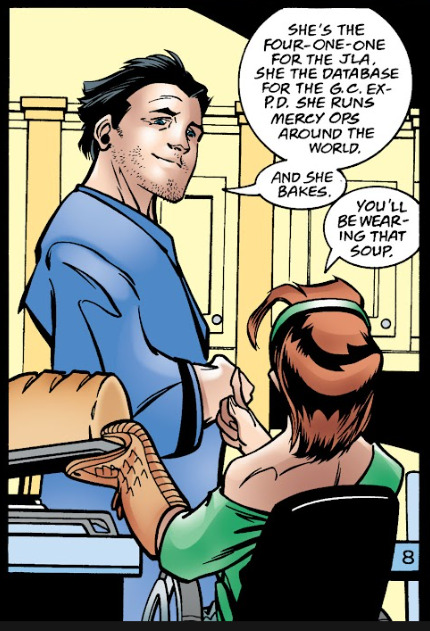
"she's the four-one-one for the jla, she the database for the g.c. ex-p.d. she runs mercy ops around the world." nightwing (1996) #38
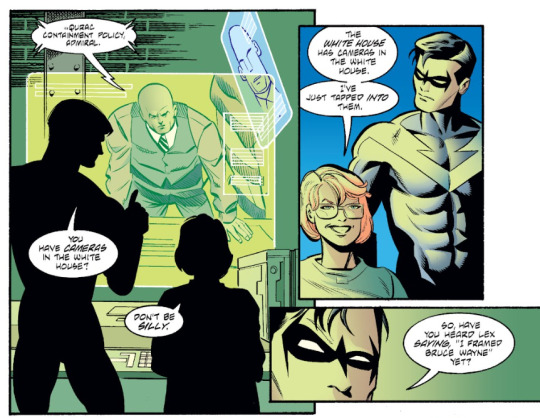
"you have cameras in the white house?" "don't be silly. the white house has cameras in the white house. i've just tapped into them." nightwing (1996) #66
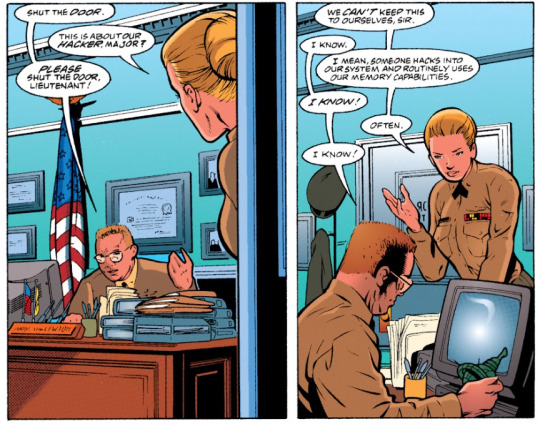
"i mean, someone hacks into our system and routinely uses our [united states air force] memory capabilities!" "i know!" "often." birds of prey #1 (1999)
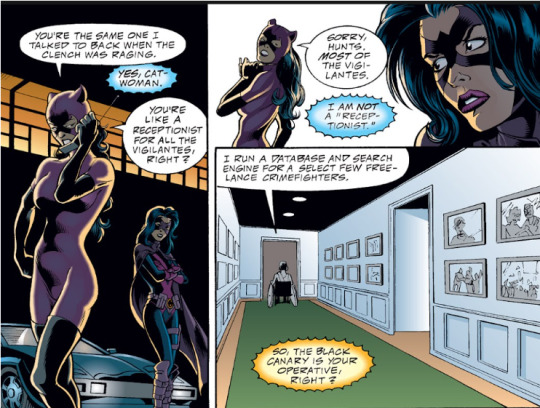
"i run a database and search engine for a select few free-land crimefighters." birds of prey: manhunt (1996)
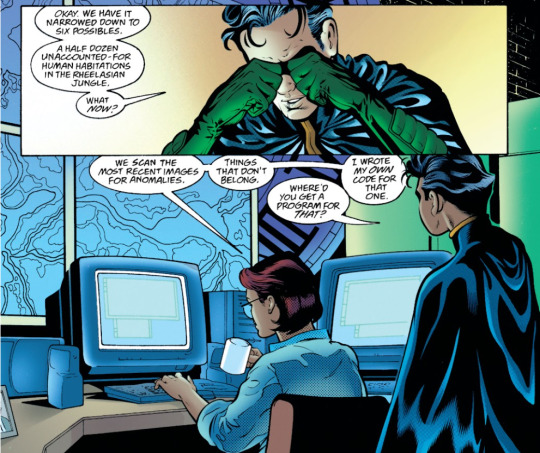
"we scan the most recent images for anomalies. things that don't belong." "where'd you get a program for that?" "i wrote my own code for that one." birds of prey (1999) #3
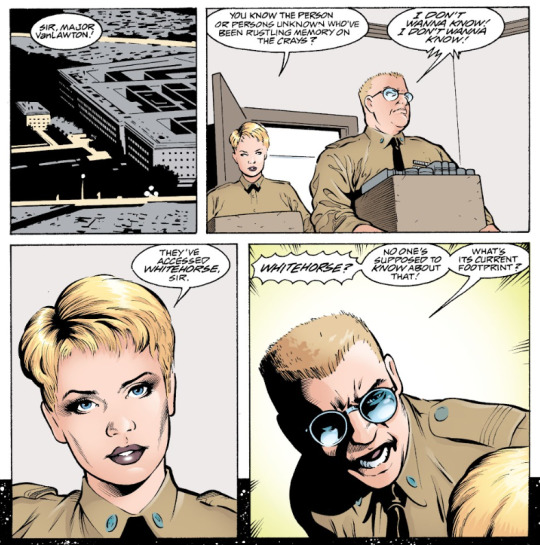
"they've accessed whitehorse, sir." "whitehorse? no one's supposed to know about that!" birds of prey (1999) #9
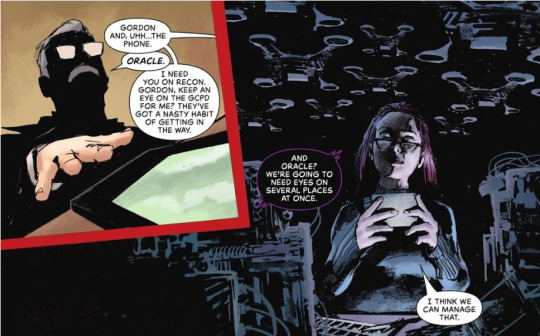
"and oracle? we're going to need eyes on several places at once." "i think we can manage that." detective comics (1937) #1077
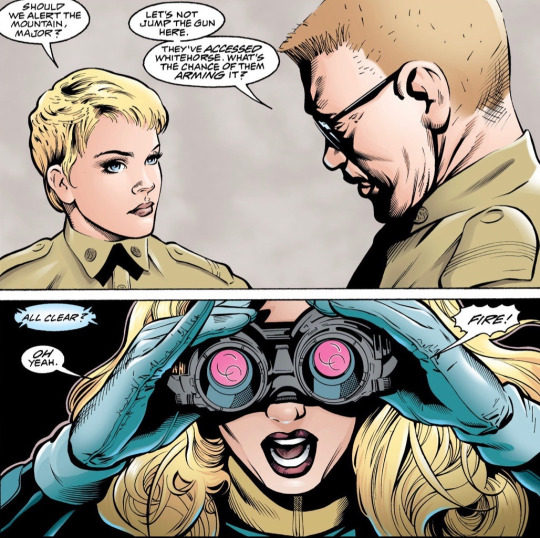
"they've accessed whitehorse. what's the chance of them arming it?" "all clear?" "oh yeah." "fire!" birds of prey (1999) #9
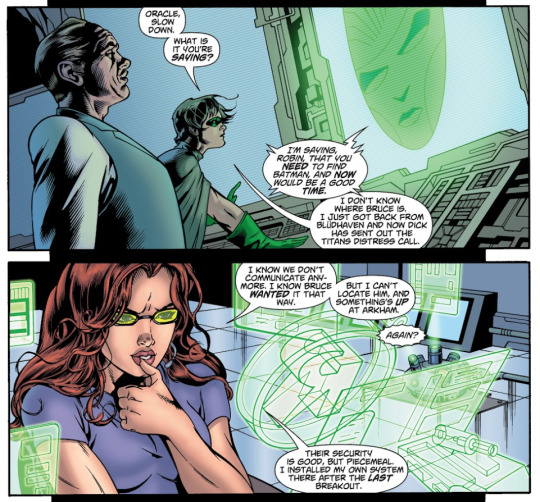
"[arkham's] security is good, but piecemeal. i installed my own system there after the last breakout." infinite crisis special: villains united (2006)
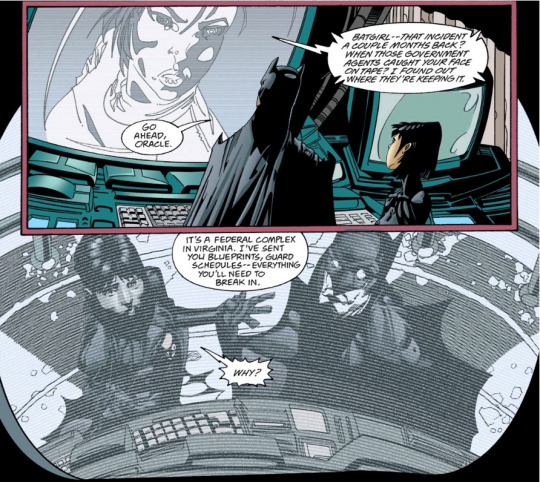
"batgirl -- that incident a couple months back? when those government agents caught your face on tape? i found out where they're keeping it. it's a federal complex in virginia. i've sent you blueprints, guard schedules -- everything you'll need to break in." batgirl (2000) #17
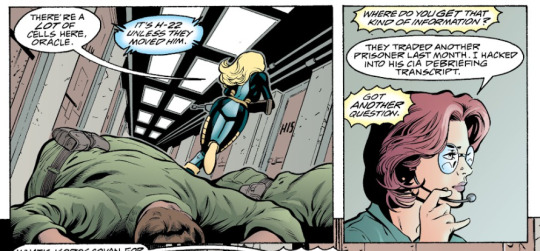
"where did you get that kind of information?" "they traded another prisoner last month. i hacked into his cia debriefing transcript." birds of prey (1999) #9
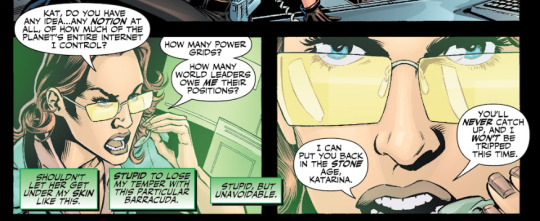
"kat, do you have any idea... any notion at all, of how much of the planet's entire internet i control? how many power grids? how many world leaders owe me their positions?" birds of prey #1 (1999)
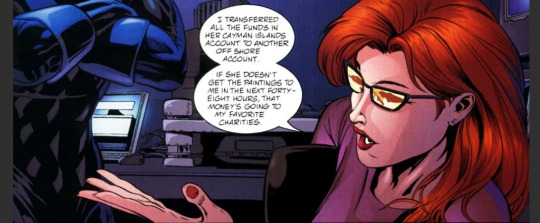
"i transferred all the funds in her cayman islands account to another offshore account. if she doesn't get the paintings to me in the next forty-eight hours, that money's going to my favorite charities." birds of prey: catwoman/oracle (2003)
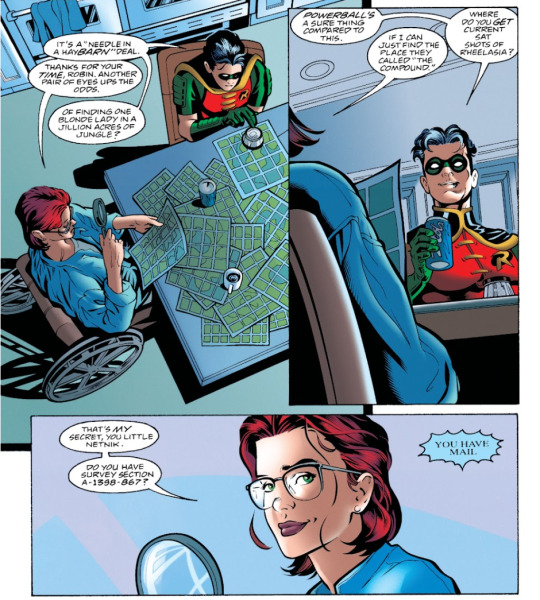
"where do you get current [satellite] shots of rheelasia?" "that's my secret, you little netnik." birds of prey (1999) #3
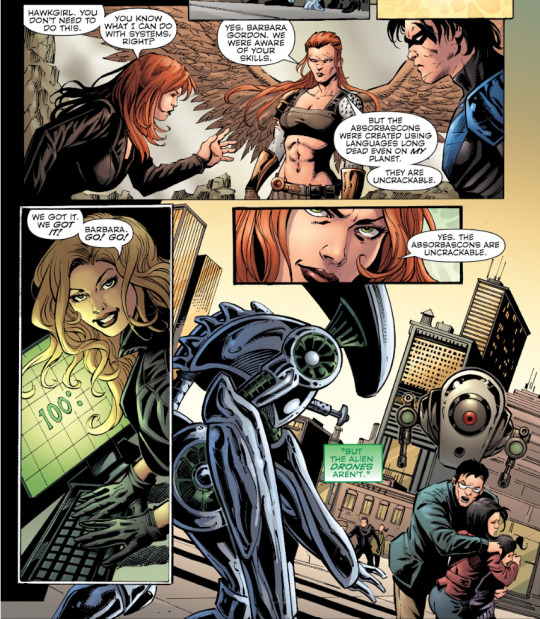
"but the asborbascons were created using languages long dead even on my planet. they are uncrackable." "yes. the absorbascons are uncrackable. but the alien drones aren't." convergence: nightwing/oracle (2015)
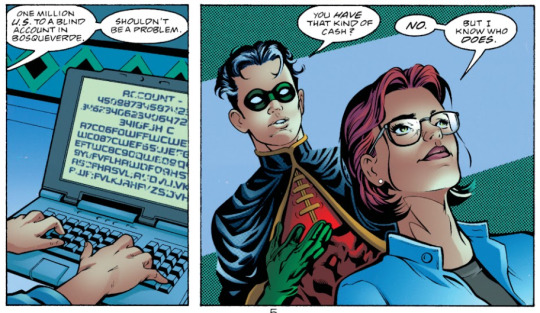
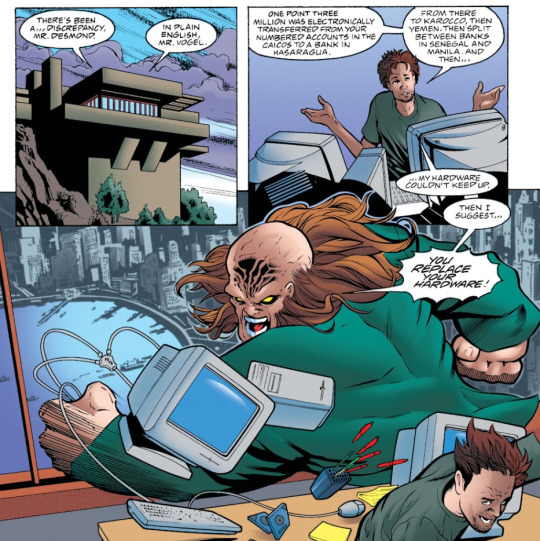
"do you have that kind of cash?" "no. but i know someone who does." "there's been a... discrepancy, mr. desmond." "in plain english, mr. vogel." "at one point, three million was electronically transferred from your numbered accounts in the caicos to a bank account in hasaragua. from there to karocco, then yemen, then split between banks in senegal and manila. and then... my hardware couldn't keep up." birds of prey (1999) #3

"seventeen million from your account in the caymans. six from santa prisca. twenty from rheelasia. and a hundred million plus from other holdings of yours around the world, mr. desmond. and where it all goes? nobody knows." birds of prey (1999) #18
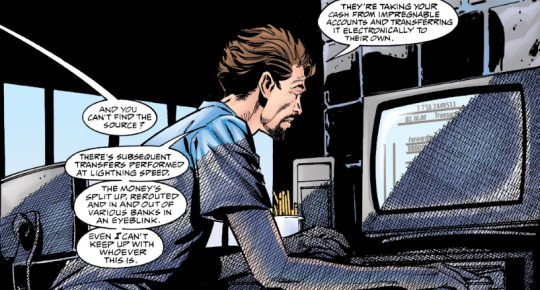
"they're taking your cash from impregnable accounts and transferring it electronically to their own." "and you can't find the source?" "there's subsequent transfers performed at lightning speed. the money's split up, rerouted in and out of various banks in an eyeblink. even i can't keep up with whoever this is." birds of prey (1999) #18

"let me handle the traffic." birds of prey (1999) #58
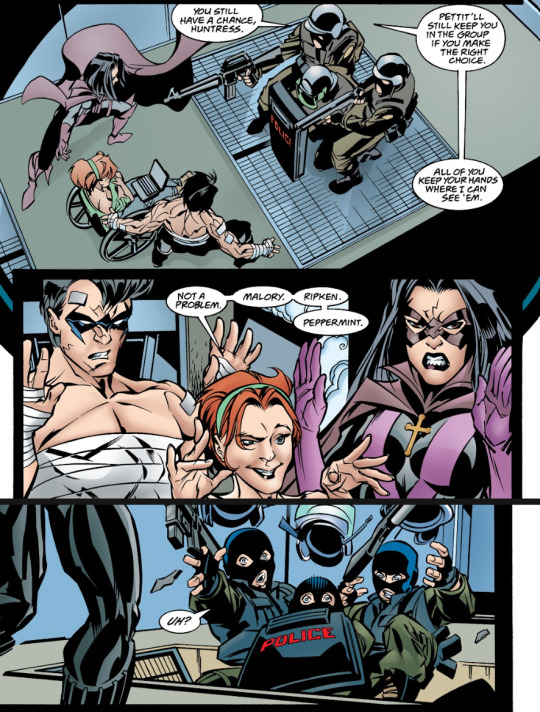
"all of you. keep your hands where i can see 'em." "not a problem. malory. ripken. peppermint." nightwing (1996) #39
#barbara gordon#babs#oracle#batgirl#birds of prey#justice league of america#jla#batman#robin#nightwing#huntress#black canary#blockbuster#dick grayson#tim drake#helena bertinelli#bruce wayne
446 notes
·
View notes
Text

The new school air quality monitoring program from IQAir will help protect children’s health while providing valuable environmental education opportunities.
#IQAir#air quality#good news#environmentalism#science#environment#nature#animals#conservation#climate change#climate crisis#usa#air pollution#environmental justice#pollution#environmental movement#environmental impact#environmental#climate and environment#environmental science#ecology
30 notes
·
View notes
Text
The Environmental Protection Agency is planning to eliminate long-standing requirements for polluters to collect and report their emissions of the heat-trapping gases that cause climate change. The move, ordered by a Trump appointee, would affect thousands of industrial facilities across the country, including oil refineries, power plants and coal mines as well as those that make petrochemicals, cement, glass, iron and steel, according to documents reviewed by ProPublica.
The Greenhouse Gas Reporting Program documents the amount of carbon dioxide, methane and other climate-warming gases emitted by individual facilities. The data, which is publicly available, guides policy decisions and constitutes a significant portion of the information the government submits to the international body that tallies global greenhouse gas pollution. Losing the data will make it harder to know how much climate-warming gas an economic sector or factory is emitting and to track those emissions over time. This granularity allows for accountability, experts say; the government can’t curb the country’s emissions without knowing where they are coming from.
“This would reduce the detail and accuracy of U.S. reporting of greenhouse gas emissions, when most countries are trying to improve their reporting,” said Michael Gillenwater, executive director of the Greenhouse Gas Management Institute. “This would also make it harder for climate policy to happen down the road.”
The program has been collecting emissions data since at least 2010. Roughly 8,000 facilities a year now report their emissions to the program. EPA officials have asked program staff to draft a rule that will drastically reduce data collection. Under the new rule, its reporting requirements would only apply to about 2,300 facilities in certain sectors of the oil and gas industry.
Climate experts expressed shock and dismay about the apparent decision to stop collecting most information on our country’s greenhouse gas emissions. “It would be a bit like unplugging the equipment that monitors the vital signs of a patient that is critically ill,” said Edward Maibach, a professor at George Mason University. “How in the world can we possibly manage this incredible threat to America’s well-being and humanity’s well-being if we’re not actually monitoring what we’re doing to exacerbate the problem?”
The EPA did not address questions from ProPublica about the Greenhouse Gas Reporting Program. Instead, the agency provided an emailed statement affirming the Trump administration’s commitment to “clean air, land, and water for EVERY American.”
26 notes
·
View notes
Text
Project Mockingbird Ch. 28
summary: the team goes on a mission, minus Bucky and Char who are...sidelined.
pairing: Bucky Barnes x OC
author's note: hello again loveliesssss! sorry for the less frequent uploads, i'm trying to stay consistent on both stories rn and also life is crazy. i have a really big final arc planned for this story and i want to do it justice so pls let me know if you're still with me and enjoying this story! THANK YOU FOR READING!
tag list: @bangtanxberm @scott-loki-barnes @kayhi808 @charmedbysarge @cjand10 @capswife @otterlycanadian @read-just-cant-stop
(let me know if you want to be added <3)
chapter list

The hum of the simulation room filled the air like white noise, smooth and constant. Early morning light filtered through the high windows of the compound, casting long shadows across the polished floor. Outside, clouds loitered, heavy and gray, but inside the mood was brighter—if a little charged.
Charlotte tugged her ponytail tight and stepped up to the control panel. Natasha and Steve flanked her, suited up in training gear. Calla lounged nearby, observing with arms crossed and a crooked smirk on her face.
Steve sighed as Charlotte keyed in the simulation parameters. “I still don’t know why I agreed to this first thing in the morning.”
Natasha’s expression didn’t budge. “Because you’re a professional, Rogers.”
"Because you’re hoping to learn some new moves," Charlotte said smoothly, not even looking up from the control panel. "From your two favorite girls who also happen to be able to kick your ass."
Natasha smirked, tilting her head. "Speaking of new moves, how’s the training room extracurriculars going? You seem to be an avid learner these days."
Charlotte clicked a few buttons, fighting a grin. "I like a full-body workout. Instructor is a menace though. I've never been more sore in my life."
Steve groaned, pinching the bridge of his nose like he could will himself out of the room. "Please, for the love of all things decent, spare me."
Natasha pressed on mercilessly. "Just saying, I've never trained so hard I broke gym equipment and a doorframe in one session."
"I do what I can," Charlotte replied, deadpan.
"You do who you can," Natasha corrected, not even attempting to veil her allusions.
Steve held up both hands. "I’m begging you. Begging. No more."
His gaze caught the setup of the scenario Charlotte had programmed. His brows pulled together. “Huh.”
Natasha followed his gaze to the screen, reading the parameters over his shoulder. Her eyes narrowed slightly. “Bit specific, isn’t it?”
Charlotte shrugged, casual. Too casual. “Keeps me sharp.”
Steve didn’t look convinced. “Hydra infiltration layout, tiered guards, perimeter breach points…we've done a variation of this every run for the last two weeks.”
Natasha crossed her arms, giving Charlotte a pointed glance. “Coincidence?”
“Totally.” Charlotte met her look evenly. "I mean, how many other global terrorist organizations do we have to rotate through? Our options are pretty limited." She turned and went back to punching in a few things on the monitor.
Steve watched her, but let it go—for now. He tapped his shield against his boot like he was filing the thought away for later.
“Alright,” Charlotte said, clapping her hands together. “Let’s get started before Old Man Rogers starts to show signs of rigor mortis.” She winked at him before walking towards the middle of the massive open room as the holographic walls began to ripple, the simulation unfolding around them. The florescent lighting shifted to mimic a cold night sky, stars hidden behind grey clouds. The smooth flooring was replaced by hard, frozen ground. An ominous building took shape up ahead of them, the infamous Hydra logo emblazoned on the door.
Steve muttered under his breath, half to Natasha, half to himself, “I’m going to mention this to Bucky.”
Natasha’s eyes stayed forward, voice low as they walked. “Good idea.”
____
The common room hummed with easy noise—silverware clinking against plates, chairs scraping back from the long table as people settled in with full plates and superhuman appetites.
Charlotte slid into her seat at the far end, tucking one leg beneath her and snagging a bread roll off the communal basket before it could make its rounds. Calla was already seated across from her, stirring something into her drink with deliberate slowness. Wanda and Peter chatted quietly nearby, Wanda nudging him every time he gestured too wildly with his fork.
Sam arrived last, setting down a casserole dish with the smug flair of a man who absolutely did not make it himself. "Dinner is served," he announced, despite having obviously swiped it from the SHIELD commissary.
"You heated it up," Charlotte pointed out dryly.
"Which is more than Barnes did," Sam shot back, dropping into the chair beside her.
Bucky, seated to Charlotte’s left, didn’t look up from his plate. "I hunt. I gather. I provide."
"You men and your primitive coping mechanisms," Calla murmured, taking a sip of her drink.
Steve, across the table, smiled faintly but didn’t engage, too focused on slicing into his portion like it had personally offended him.
Peter, wide-eyed and earnest, pointed his fork at Sam. "Wait, you actually know how to cook? That’s so cool."
"First of all," Sam said, leaning back with mock offense, "yes. Second of all, none of you get to act surprised after I carried dinner home like a victorious champion. Third of all—"
"Don’t say it," Bucky warned, eyes narrowing without looking up.
Sam grinned anyway. "Third of all, as long as you two stay out of my bedroom, we’ll call it even."
Charlotte didn’t miss a beat. She bit into her roll, chewed thoughtfully, then said around her bite, "No promises."
Peter coughed into his water. Wanda elbowed him, fighting back a grin.
"Sam," Steve sighed, already regretting his life choices.
"What?" Sam lifted his hands innocently. "Somebody had to say it. Whole training wing's still under repair. Maintenance has questions. I have questions. Mostly about how structurally unsound our infrastructure apparently is."
Calla chimed in without looking up from her plate. "I don’t think it was the infrastructure. I think it was operator error. Or operator enthusiasm."
Charlotte raised her glass slightly, like she was toasting the accusation. "Guilty as charged."
Bucky, deadpan, finally glanced up. "You’re all very lucky I like this bread. Otherwise, I’d leave."
"Like you could leave her side for more than five minutes," Sam muttered, earning a glare that was half-hearted at best.
The banter rolled on as plates filled and refilled. The conversation shifted to tomorrow’s mission, the easy mood dimming just a shade.
"We’re wheels up at 0500," Steve reminded them. "Simple extraction. Should be in and out."
An awkward pause settled over the table. Everyone knew who wasn’t included in "we."
Charlotte broke it smoothly, raising her glass again. "Well, some of us will be here holding down the fort. Providing moral support. Making sarcastic commentary. Keeping Sam’s room warm."
Sam barked a laugh, pointing his fork at her. "I swear, you so much as breathe in my doorway—"
"—and you’ll do what?" Charlotte shot back, one brow raised.
Sam opened his mouth, paused, then chuckled as he shook his head. "Touché."
The tension bled away under the warmth of familiar rhythms. They slipped back into easier conversation, plates scraped clean, glasses emptied and refilled. Even as the night wound down, the current beneath it all remained—quiet, but steady.
Charlotte felt it thrumming beneath her ribs, thrumming louder than the laughter around her.
Soon.
_____
They hadn’t been spending many nights apart—not since they reconciled. Not every evening ended in tangled sheets or flushed skin, but they always ended up in the same bed. Sometimes Charlotte crashed in his room, sometimes he ended up in hers. Sometimes they talked until they passed out. Sometimes they didn’t talk at all. But they hadn’t been alone, not really, in days.
Tonight, Bucky’s room. The compound was quiet around them, dipped in late-night stillness. Outside, storm clouds loomed, but only the occasional gust of wind rattled the windows. Inside, the warmth between them was dense and steady. Charlotte lay curled against him, one leg hooked over his thigh, breathing slow, dreams weightless.
Until his weren’t.
It started in his breathing—shallow and sharp, chest rising faster. Then the tension came, coiled in every limb. His fingers twitched. A faint sound escaped his throat, somewhere between a growl and a gasp.
Charlotte’s eyes fluttered open. She tensed but didn’t startle, didn’t move suddenly. She just watched him for a second, wide and wary eyes studying him in the darkness. Then she shifted, bracing herself on one elbow.
“Bucky,” she murmured softly, voice low but firm. No answer. He was too deep in it. Too lost.
She tried first with a whisper, brushing the hair from his forehead. "Bucky," she murmured again, a little louder this time. Still nothing.
Her palm pressed flat to his chest, feeling the erratic thunder of his heartbeat. She gave his shoulder a shake. "Hey. You're safe. It's okay."
He didn’t stir. If anything, his body coiled tighter. Then, suddenly, he jerked—one sharp, panicked movement that nearly knocked her off the bed. Charlotte caught herself, breath caught in her throat.
That was when she knew: words wouldn’t work. Not this time. He was too far gone.
So she changed tactics.
She pressed her palm to his chest again. His skin was damp with sweat, heartbeat erratic beneath her hand. Her fingers slid lower, down his taut stomach, over his flexed muscles. She climbed over him, slow, one thigh sliding across his hips until she was straddling him. He was rigid beneath her, still caught in some far-off hell, but the warmth of her, the weight of her—it cut through.
“Come back to me,” she said, soft but commanding.
His breathing hitched. His hands fisted the sheets.
Charlotte rolled her hips gently once—just enough to stir something deeper. Then again. A low sound left his throat, almost wounded.
His eyes opened, finally. Glazed and wild, pupils blown wide. He stared up at her like she’d dragged him from the bottom of the ocean.
“You’re not dreaming anymore,” she whispered.
His voice cracked. “You sure?”
She leaned down, brushing her nose against his. “Positive.”
He reached for her—grasping, desperate. His hands found her hips, fingers digging in. She caught his wrists before he could flip them, pinned them to the mattress. Her pace didn’t change.
“Breathe,” she told him. “With me.”
He did.
She shifted slightly, lifting just enough to slip her sleep shorts down her legs and off the bed. Bucky’s breath hitched, but he didn’t stop her—just reached for the waistband of his own boxers and tugged them down, rough and impatient. Skin to skin now, the contact finally broke through what little fog remained.
She sank down on him slowly, a low gasp caught in her throat as he filled her. His hands clutched her hips, holding on like she was the only thing anchoring him to the present.
Bucky let out a shuddered breath, wrecked. “Fuck, Char…”
The rhythm between them built, slow but relentless. Not polished. Not gentle. Raw, like something scraped bare. Every roll of her hips reclaimed him. Every movement said you’re here, you’re safe, you’re mine.
“James Buchanan Barnes,” she breathed, dragging his full name out like a lifeline. “Stay with me.”
He choked on a laugh—wrecked, breathless. “You…you keep doing that, I’m not gonna survive.”
“You’ve survived worse.”
His hands cupped her face now, thumbs brushing her cheekbones. “You’re the only thing that keeps me alive.”
She stilled, leaning down so her forehead pressed to his while he was still embedded deeply inside her.
The storm outside cracked, wind howling against the windowpanes.
They didn’t move.
Eventually, she collapsed onto his chest, their skin sticky, hearts thudding in sync. His hand slid into her hair, holding her there like if he let go, she might disappear.
Neither of them spoke. But his nightmares didn't come back that night.
___
The kitchen lights were still set to their low nighttime mode when Charlotte padded into the common room, sweatshirt sleeves hanging down past her hands and hair still damp from a quick rinse. Outside, the world was still a shadow—barely past dawn, grey clouds low and unmoving—but inside, the coffee smelled strong, and the mission team was gearing up. One thing they all had in common was a passionate distaste for overhead lighting, especially early in the morning.
Steve stood by the counter, mug in hand, scanning his tablet with military focus. Wanda and Sam leaned against the island, mid-conversation, while Natasha slid two Pop-Tarts into the toaster. Peter, who'd flow in sometime the night before, was bouncing on the balls of his feet, was trying to stifle a yawn.
Charlotte leaned on the opposite counter, stealing the last clean mug and pouring herself a cup of coffee. “You all look like the cautionary shot at the beginning of a Folgers commercial.”
Sam gave her a look. “That’s because we’re the only competent ones left. Somebody’s gotta save the world while you and Barnes play house.”
“Please,” Charlotte replied, sipping her coffee. “I’d hardly call ‘rescuing the senator’s idiot son from being kidnapped again so his daddy doesn't have to pay the ransom he can definitely afford’ world-saving. Sounds more like community service.”
Natasha didn’t even look up from her pastries. “She’s got a point. The kid practically FaceTimed his kidnappers to give them his location.”
Sam rolled his eyes. “Doesn’t mean it’s not important. International optics, political leverage—”
“Oh yeah,” Charlotte cut in, voice flat. “Nothing screams geopolitical leverage like a hostage who tried to bribe his captors with crypto and feet pics.”
Peter choked on his orange juice. “Wait, what?”
Wanda winced. “I didn’t need that image. It’s too early.”
"To be fair," Nat spoke through a full mouth. "Foot photos from an incredibly conservative and polarizing politician's son would probably fetch a pretty penny from the right buyer."
Charlotte pointed at her, raising her eyebrows at Sam. "See!"
“I see nothing,” Sam said, splitting the remaining coffee in the pot between his mug and Charlotte's. “Except a mission briefing and an order. Which I follow. Because I'm not benched.”
“Ouch,” Charlotte muttered, sipping her coffee.
"If you can't take the heat..." he winked at her and began making another pot.
At that moment, Bucky entered, looking like he’d already lost a fight with the morning. Hair damp, sweatshirt loose, and expression set to default scowl. He walked straight to the counter and reached for the coffee pot only to realize it had mere drops in it. The look on his face when he turned was nothing short of a grimace.
“Aw,” Sam said sweetly. “Did the caveman not get his beauty sleep?”
Bucky didn’t even blink. “Keep talking and I’m putting your toothbrush in the toilet.”
"Good morning to you too, sunshine."
"Sam, if you keep provoking the rogue agents, we aren't responsible for what happens to you." Nat warned.
Steve chuckled, setting down his mug. “Okay, okay. We’re wheels up in forty-five. Let's move down to the equipment room.”
There was a pause. Everyone nodded. Quiet but comfortable. Shifting into action mode, like they'd done dozens of times before. As they filed toward the elevator, Sam turned and pointed a finger at Bucky. “And stay outta my damn room.”
“Go to hell, Wilson.”
Peter looked between them, wide-eyed. “Why would he be in your—?”
“Don’t ask,” Wanda said quickly, grabbing Peter by the shoulder and steering him out of the room.
Charlotte sipped her coffee and watched them go, her expression unreadable. She didn’t say anything until the last of them disappeared behind the sliding doors.
Then she looked up at Bucky. “Wanna run a sim?”
He glanced at her. “A little early for that, don’t you think?”
“C’mon,” she said, already moving. “You know I get cranky if I don’t get my fix of simulated death before noon.”
Bucky followed with a sigh, coffee in hand. “You’re gonna kill me.”
“I'm just keeping you sharp. You should be thanking me.”
Bucky paused behind her, then reached out and pulled her close by the waist. His voice was quiet, rough-edged. "I should be thanking you. For last night."
Charlotte leaned into him, fingers brushing over the back of his hand where it rested against her stomach. "You already did. Quite thoroughly, if I remember."
He huffed a small laugh, but his tone stayed earnest. "Not for that."
She turned in his arms, meeting his gaze. There was something steady in it. It was open, honest in a way he didn’t always allow himself to be. He wasn’t thanking her for anything physical and they both knew it.
Her hands slid up his chest. "Don't mention it."
They stood like that for a moment, close and still and warm in the quiet kitchen. She nudged him lightly. "You disappointed you’re not going with them?"
Bucky’s expression twisted into a dry smirk. "You mean am I crushed to miss Sam’s impassioned speeches and Peter’s early morning optimism? Devastated."
Charlotte smiled, but didn’t let him off the hook. "I’m serious. I just want to make sure you don’t regret benching yourself."
He shook his head. "I don’t. Not for a second."
She searched his face, but whatever she was looking for, she seemed to find it. Finally, she nodded. "Okay. Good. Sim?"
Bucky glanced around the now-empty room, then back to her. “We’ve got the place to ourselves. Sit with me a minute.”
Charlotte hesitated, eyes flicking toward the elevator. “I was kinda hoping to get the jump on you while you’re still groggy.”
“Sit,” he repeated, guiding her gently toward the barstools at the kitchen island. “We never get the quiet.”
She relented, dropping beside him with a sigh. “Fine. But I'll need a refill.”
He didn’t answer right away, just raised an eyebrow as he reached for the pot and brought it over to her raised mug. Her eyes stayed on the pour, a flicker of tension just behind her teasing smile. He caught it—barely, but it was there.
“You okay?” he asked, casual but careful.
Charlotte’s voice was too light. “Just eager to kick your ass in a training sim. What, is that illegal now?”
His gaze didn’t waver.
She nudged him. “If you make pancakes, I’ll stay.”
Bucky raised a brow. “Chocolate chips?”
“Obviously.”
“Then it’s a deal.”
They settled back in the quiet. Just for now.
___
The sim room was cold and cavernous, echoing with their footsteps as they stepped inside. Charlotte keyed in a sequence at the console, fingers flying with practiced ease. Of all the team members, she logged the most hours training here. Whether it was her distaste for the SHIELD agents, her free time from being one of the few that didn’t assist with training them, or the fact that she was a chronic yes man to all the others and never declined a chance to train with them, it had become her most-frequented spot at the compound.
Bucky leaned against the edge of the console, arms crossed as he looked her over. Her outfit was full combat-ready: black tactical pants tucked into scuffed boots, utility belt fastened with spare mags and two pistols holstered, tight compression top layered beneath a reinforced vest holding a dozen knives at her ribs, shoulders armored, her own version of the Widow’s Bite wrist arsenals on each arm. Her hair was tied back in a high braid, and her gloves were already on. She looked more like she was heading into a battlefield than a simulated spar.
“You know they make training suits for a reason, right?”
Charlotte didn’t even glance up. “And miss the opportunity to haul thirty pounds of gear around for no reason? Sounds lazy.”
“It wouldn't take you ten minutes to suit up if you didn’t wear the full tac suit. You planning to deploy mid-simulation?”
She finished setting up the program and shot him a smug look as it began to whir to life around them. “Train like you’ll fight, soldier.”
Bucky huffed a laugh. “You sound like Steve.”
“No wonder you like me so much.”
She turned to the center of the room as the grey walls shifted into the landscape she’d selected. Bucky followed suit, taking it in. “This base looks familiar. Is this…is this Hydra?”
She shrugged. “I’ve been using a lot of their base layouts lately.”
“That’s weird.”
“It’s not weird.”
“It’s very weird.” He narrowed his eyes. “Why would you choose to put yourself in this setting, Char?”
“Call it exposure therapy.” She grinned. “Maybe I just like watching you shoot Nazis.”
His brows furrowed. He didn’t buy it, but he let it go.
“Alright, do you want to keep chatting, or can we kick some ass now?”
Bucky rolled his eyes but pulled the guns from each of his thigh holsters and began to walk through the field towards the looming building in front of them. Charlotte took a breath, set her shoulders and followed.
___
Afternoon light filtered through the high windows of the training wing, casting long, slanted shadows over the gym mats and racks of weapons. The place was nearly empty with most of the team on mission, and Bucky now roped into teaching not only his ordinary training groups, but also Steve and Sam's. Charlotte, left to her own devices, was burning through her third workout of the day. After their joint simulation, she'd big goodbye to Bucky and then run the same one two more times herself. Each time, she'd vary the parameters or the circumstances just enough to keep her on her toes. By the time she'd made it to the training room, she was already tired and bruised all over. That was hours ago.
Her breathing was heavy, sharp and rhythmic. Sweat clung to her temple as she finished her another run—twenty burpees, a hundred-meter sprint, twenty pushups, kettlebell swings, a full-body throw against the sandbag dummy, then again. And again.
She paused at the edge of the mat, swiping her forearm across her brow before glancing at her bracelet. Still amber. But barely. Not red. Not even close. Not yet.
Charlotte exhaled, dragging in the humid air through her nose. She was stronger now. Her limits had stretched in the last few weeks—what once pushed her into burnout now just made her tired. She wasn’t Steve, wasn’t Bucky. But she wasn’t the girl that blacked out in the woods, either.
She adjusted the wraps on her hands and moved to the heavy bag, striking with clean, brutal precision. Her hits were faster now. Sharper. Less rage, more control.
The room echoed with the rhythm of her fists.
She put everything she had into every strike.
Train like you fight.
____
Bright lights. Too many colors. The endless hum of slot machines. Charlotte sat at the bar, drink in hand, posture relaxed but eyes sharp.
Across the casino, a senator swept in with six security guards flanking her. Suits. Dark glasses. The works. Charlotte’s entire body went still.
The way they moved. The silence around them. It was too clean. Too precise. Too Hydra.
She stared at her drink. Her hands trembled.
They’ll never stop coming for me.
She finished the glass. Left without saying a word.
That night, in her hotel room, she woke up gasping, fingers digging into the mattress. Sweat soaked her shirt. A knock at a door down the hall made her flinch.
She didn’t sleep again.
Back then, she told herself she’d run forever if she had to.
Now, she knew better.
She wouldn’t run. Not anymore.
The common room was oddly quiet for the evening, the lack of noise and laughter even more apparent at night. Sounds of cooking filled the air, but Charlotte was too distracted to really listen to them. From Bucky's room, the water shut off with a dull hiss, and a moment later, he stepped into the hallway, towel slung low on his hips. His hair was damp, curling slightly at the ends. He padded barefoot into the kitchen and paused.
Charlotte stood in front of the stove, arms crossed, brow furrowed at the screen of her phone propped up on the counter. A cooking video played silently, all fast cuts and aesthetic angles.
"I don’t want to hear you narrate it," she grumbled at the screen. "I want to see your damn hands."
Despite her frustration, the kitchen smelled incredible—roasted garlic, lemon, something spicy.
"Smells like you figured it out anyway," Bucky said, tugging a shirt on as he leaned against the doorframe.
"Trial and error," Charlotte muttered, still squinting at the phone. "Heavy on the error."
"You didn't have to go to all this trouble, y'know. It's just us."
She glanced over her shoulder, catching his eye with a smile. "Well, I owed you a meal," she said, nodding toward the stove. "You made pancakes. Figured I should return the favor."
"So whatever I do for you, you'll return the favor?" he asked, stepping closer, brushing a hand against the curve of her back. "Remind me to cash in more often."
"You’re insufferable," she said, though the corner of her mouth twitched like she was trying not to grin.
"But charming. And hungry," he added. "Come on. Let’s eat on the balcony. It’s a nice night—and Wanda’s not here to insist we all eat at the table."
Charlotte let out a theatrical gasp. "Finally, some anarchy around here."
They took their plates outside and settled in as the sky began to deepen. She continued to make excuses for her cooking and curse the nearly impossible-to-mimic video, but when they sat down to eat—plates balanced on the small balcony table, a light breeze brushing past them—the meal was damn near perfect.
They didn’t talk much at first. The sun was sinking low, bathing the compound grounds in amber light.
Charlotte nudged his leg under the table with hers. "So, Pancake Chef Extraordinaire. That what you’d be doing if your world hadn’t fallen apart?"
He huffed a quiet laugh. "Something like that. Steve and I always thought we’d stay in Brooklyn. He wanted to be an artist. I always said I'd get a real job, maybe something in finance. One of us would have to be able to make rent."
"I can't picture you in a suit, but I don't think I'd hate the sight."
He gave her a side glance. "Don't get your hopes up."
She smiled into her glass. "Maybe our next undercover job you'll get to live out your Wall Street fantasies."
"My fantasy or yours?" He raised an eyebrow.
"One and the same."
He chuckled, then went quiet for a beat. "I haven't given thought to what else I'd do in a long time."
Charlotte turned toward him, her voice soft. "I don't know that I ever really have."
Bucky looked at her for a long second, eyes tracing the slope of her profile in the amber light. “You’re still young. Plenty of time to figure it out.”
She smiled faintly, but it didn’t quite reach her eyes. “Young is relative.”
He reached out, brushing a thumb across her cheekbone. “Hey,” he said gently. “You’re not exactly running out of time.”
She leaned into his touch—just for a second—then pulled back with a quick shake of her head, as if chasing away a thought. “Anyway,” she said brightly, rising to her feet and collecting their plates. “Dinner’s not gonna clear itself.”
Bucky stood up with her, catching her wrist before she could step inside. “Hey. Sit down. I’ve got it.”
“You cooked and cleaned this morning,” she argued.
“And doing a few more dishes won't kill me. Let me do this.” His voice was soft but firm. “Sit. Breathe. Enjoy the quiet for a minute.”
Charlotte hesitated, but something in his eyes settled her.
She handed over the plates with a grateful look. “Fine. But I’m picking the movie tonight.”
“You picked last time,” he called over his shoulder.
She smirked. “And I’ll pick the next one, too. Get used to it.”
When he returned, Charlotte didn’t turn from where she stood at the railing, soaking in the last of the light. She just leaned into his side as he slid an arm around her waist. They stood like that for a while, quiet.
Then she shifted to face him, her hand rising to touch his jaw. He was freshly shaven, and she ran her thumb slowly along his cheekbone.
"Char," he murmured, eyes on her lips. "Yeah?"
"I don't wanna watch a movie."
She blinked up at him, lips parting. “No?”
He shook his head, voice low. “No.”
Charlotte's breath caught. “How did you plan to pass the time?”
“Hmm.” His hands slid to her hips, thumbs pressing into the dip of her waist. “Thought about a few ways today.”
Her fingers toyed with the hem of his shirt. “Mmm, do tell.”
“I think I'd rather show you.”
He leaned in, kissing her like it was inevitable. Slow and unhurried. Like they had forever. Her hands rose to his shoulders, then tangled in his hair as he deepened it. She opened for him, melting into the kiss as if her entire body knew what came next.
He pulled her closer, hands sliding down her back, under the hem of her shirt. Skin to skin. She sighed into him.
They parted only long enough to breathe.
“I never want to stop kissing you,” she whispered against his mouth.
“Good,” he rasped. “Because I’m obsessed with you.”
She laughed quietly, lips brushing his again. “Let’s go inside.”
He caught her wrist gently. “No. Stay here. Sun’s down. Sky’s ours.”
They lowered onto the cushioned bench near the railing, limbs tangled. His mouth never left her skin—her collarbone, her shoulder, the side of her neck. Every kiss slow, deliberate.
She shifted to straddle him, hands finding the hem of her shirt and tugging it up over her head. His eyes darkened, hungry and reverent all at once. He helped her shimmy out of her bottoms, his own hands dragging at his waistband.
The first moment they came together was soft and devastating—her hips rolling down slow, his breath a shudder in her ear.
They moved like they knew every inch of each other. Because they did.
Outside, the sky turned deep navy, a single star blinking above the horizon.
Neither of them noticed.
_____
Bright lights. Too many colors. The endless hum of slot machines layered over the clink of ice in glasses and low laughter. Charlotte sat at the bar, drink in hand, posture relaxed but eyes sharp. Her reflection in the mirrored shelves behind the bar looked normal. Composed. Almost bored.
But her pulse was racing.
Across the casino floor, a senator swept in with six security guards flanking him. Suits. Dark glasses. Earpieces. The works.
Charlotte’s entire body went still.
The way they moved. The tight formation. The silence around them, the way conversations seemed to bend around their presence.
Too clean. Too precise. Too Hydra.
She turned her face toward her drink, heart pounding so hard it made the glass tremble in her grip. Her palms were slick. Her mouth dry.
A flash of movement at the corner of her vision—a guard adjusting his sleeve. She flinched.
Her breath came short. Her chest ached with the effort of staying calm, staying still, staying invisible. She couldn’t remember how to breathe.
They’ll never stop coming for me.
She left the bar without finishing her drink, tossing a hundred dollar chip onto the marble surface before stumbling out onto the neon-soaked street. She thought she could outrun the feeling. That maybe if she just kept walking, it wouldn’t follow. She kept her head down. Her heels clacked rapidly against the concrete as she bobbed through the crowd.
Just keep moving. Just keep going.
She must have walked a mile before beginning to slow down, finally daring to lift her head up. Right as she did, she walked smack into the chest of a suited man towering over her. Viselike fists gripped her arms as he muttered into an earpiece.
"Ich hab sie. Sie kommt nach Hause.“ I've got her. She's coming home.
Charlotte sat bolt upright in bed, gasping for breath, thrashing to break free from a grip that only existed in her mind. Her chest heaved as Bucky sat upright next to her, immediately rubbing her back.
"Breathe, baby," He murmured, sleep weighing down his voice. "You're safe, I'm here."
She nodded, but couldn't form words. Just kept choking down oxygen. Her hands balled into fists against the plush comforter, grounding herself in this room. This compound. In freedom. She hadn't had this nightmare since she left Las Vegas. It used to plague her nearly every night, making her move hotels, change her hair, hole up in her room for days on end. She hadn't had it in months, and yet here was the feeling all over again. The horrific, suffocation realization that no matter where she went, they'd never stop coming for her.
Back then, she told herself she’d run forever if she had to. She’d burn through passports, disappear, erase herself. She'd stay one step again, stay gone for the rest of her life.
Now, she was different.
She wouldn’t run. Not anymore.
7 notes
·
View notes
Text
The List -- Fraud, Waste and Abuse Edition
I asked ChatGPT to look at one of the earlier lists of authoritarian actions the Trump Regime is taking and categorize them according to the labels "fraud, waste and abuse". The goal was to have AI categorize and list which action represented fraud (a lie or cheat of the American people), waste (an action that was wasteful of resources) or abuse (an action that was deliberately abusive in nature against the American people), and here's the list: The original list can be found here: https://theweeklylistreturns.substack.com/p/week-17-the-return
Here’s a recategorization of the entries based on Fraud, Waste, and Abuse:
FRAUD (Cheating the American People)
Media and Information Manipulation
WAPO restricting opinion pieces to only pro-libertarian, pro-free-market views.
White House barring major media outlets while allowing only conservative news sources.
Voice of America journalists facing HR investigations for critical reporting on Trump.
AI-generated video depicting "TRUMP GAZA" misrepresenting geopolitical reality.
Corruption and Conflicts of Interest
Dr. Mehmet Oz retaining millions in investments despite nomination to oversee Medicare/Medicaid.
Lynn Dekleva’s appointment to EPA despite prior lobbying for chemical industries.
Capital One, Rocket Mortgage, and other corporations escaping consumer protection lawsuits under Trump’s CFPB.
Zelle network operators, including major banks, escaping fraud investigations due to CFPB case dismissals.
Musk inserting DOGE personnel into FAA while SpaceX stands to win a major $2.4 billion contract.
Musk influencing NASA operations and receiving private access to internal agency discussions.
Election and Legal Manipulation
DOJ reviewing conviction of Tina Peters, a convicted election conspiracist.
Harmeet Dhillon and John Sauer suggesting some court orders can be ignored.
Demotion of prosecutors overseeing Capitol insurrection cases.
Trump pardoning January 6 defendants and shutting down investigations into domestic extremism.
House Republicans attempting to extend Trump’s presidency beyond two terms.
Trump proposing national crypto reserve, raising conflict-of-interest concerns.
Trump's DOJ delaying foreign bribery cases under the pretext of reassessing corruption laws.
WASTE (Destroying Essential Programs and Services)
Federal Budget and Economic Policy
Mass layoffs across federal agencies, including 10,000 EPA staff and nearly all 1,700 CFPB employees.
Foreign aid freeze cutting off health and disaster relief funding worldwide.
Termination of USAID programs combating polio, HIV, and malaria.
Attempt to defund universities over "illegal protests," violating the First Amendment.
Pausing military aid to Ukraine despite ongoing war.
Stock market crashes due to abrupt tariff announcements, harming U.S. economy.
Trump tariffs against Canada, Mexico, and China escalating trade wars.
Overhaul of rural broadband program to favor Starlink, awarding billions to Musk.
Musk manipulating air safety concerns to justify Starlink involvement in FAA.
Mismanagement of Agencies
Abandoning lawsuits against chemical companies accused of releasing carcinogens.
Closing civil rights and anti-discrimination enforcement offices under DOGE.
Halting State Department’s global air quality monitoring program after a decade.
Ending federal policies allowing language assistance for non-English speakers.
GOP’s "big beautiful bill" cutting key programs like Medicaid and food assistance.
Environmental and Public Infrastructure Neglect
Dismantling of NOAA, jeopardizing weather forecasting and climate research.
Closing of National Park Service offices, leading to nationwide protests.
Cuts to FEMA disaster relief workforce weeks before hurricane season.
Ending federal enforcement of clean air and water regulations.
ABUSE (Harming or Causing Distress to Americans)
Targeting Vulnerable Populations
Trump regime removing all transgender troops unless granted a waiver.
Federal judge blocking attempts to withhold hospital funding for trans youth.
Ending hiring discrimination lawsuits, enabling racial bias in policing and fire departments.
ICE attempting to obtain home addresses of 700,000 undocumented immigrants.
DOGE seeking IRS tax records to target recipients of government benefits.
Undermining Public Safety
Trump-appointed officials ordering mass layoffs of air traffic controllers.
Musk soliciting retired air traffic controllers due to FAA staffing crisis.
Halting cyber defense operations against Russia, putting national security at risk.
Removing high-ranking Black military officials from leadership roles.
Attempt to rename Fort Moore to honor a Confederate general.
Authoritarian and Anti-Democratic Actions
White House pressuring USAID to cover up impacts of foreign aid freeze.
Targeting federal judges who oppose Trump’s agenda.
Seizing and transporting classified document boxes on Air Force One.
House Republicans introducing bills to rename federal buildings after Trump.
Human Rights and Foreign Policy Failures
Zelensky humiliated at the White House, leading to international fallout.
Abandoning U.S. military aid and intelligence support for Ukraine.
Praising Putin while criticizing NATO allies.
Cutting U.S. foreign aid while China, Russia, and Iran expand influence.
GOP officials pressuring Zelensky to "apologize" to Trump.
Arrest and deportation threats increasing for immigrants under ICE expansion.
Conclusion
Fraud: Policies that deceive the public or enable corruption.
Waste: Reckless destruction of necessary government functions and resources.
Abuse: Policies designed to cause harm, distress, or fear to specific groups or the general public.
This categorization highlights how many of these actions fit into a broader pattern of corruption, negligence, and authoritarian behavior.
11 notes
·
View notes
Text
Also reading the lore, Anubis was created to be in charge of ecological balance. With ALL the crap ow's humanity was doing, it can be inferred Anubis was forced to sacrifice entire species for humanity's survival. When humanity kept squandering healthy change, Anubis did what it was programmed to do: keep earth's ecological systems in balance. The biggest threat WAS humanity. Declassified stated after yet another round of global conservation talks that went no where, Anubis' monitoring team was taken out by limiting the air vents. (<We don't know what caused the ventilation shut down to occur. Could have been Anubis, could have been an outside actor aiming to sabotage Anubis.)
Then Anubis went 'rogue'
^ But I don't think Anubis went "rogue" -- Anubis was doing exactly what it was programmed to do. Balance the ecological systems of earth. And if there was any non human species causing a mass extinction event like humanity was doing, anubis would prune it. Logically, it HAD to have pruned species before.
Bc of what Anubis did, it implies ow humanity was statistically likely to end up killing earth, so Anubis determined it was worth the risk of causing some eco damage vs complete eco destruction if humanity kept it's course.
But Anubis lost, and now earth is severely damaged PLUS it doesn't have a god ai to oversee the entire systems PLUS the ecopoints have become more and more disjointed, with unsettling new weather anomalies and seemingly energy spikes out if no where (it's confirmed anubis had created secret omniums like in the east China sea, so I guess that there are more secret omniums, one could be in antarctica to match the unsual readings Mei discussed in the PVE codex.)
All this to say, by technicalities... #AnubisWasRight lmafo. Yet ow portrays Anubis as 'rogue' but like. Humanity made a stupidly designed tool, and was punished for hubris.
But then we look at how Ramattra disagrees with Anubis. And I find that really fascinating. We know it's in part of Ramattra disagreeing with how Anubis sent omnics to thier demise, but that's hindsight for the Awakening. So what could it be? ...I genuinely think Ramattra disagrees with the purposeful extinction of humanity. Ramattra is fighting humanity, yes, but only for omnic liberation from humanity's oppression.
I think his view is that trusting humanity as a species is dangerous bc humanity is not a hivemind like omnics can be. Humans cannot unilaterally organize, which causes violence and no assured generational safety. And omnics NEED assured safety throughout the generations bc if one human generation grants omnics liberation, only for the 3rd human generation to deny it again? Omnics are FINITE. They can't afford humanity's wishy washy organization when it comes to omnic's right to exist. Ramattra admires ant colonies: an ant colony is a super organism. He admires the things they build together, and how they cooperate when threatened.
I think this is why Ramattra is fine with individual "helpful humans" but not humanity as a whole bc humanity isn't a superorganism. I'm not sure where OW is going with Ramattra, but having Ramattra default like Bastion did with Anubis coding, and become the very thing Ram was terrified of becoming is a really wild take, doomed by the narrative fr. Narratively it's nature vs nurture question but uh... omnics are not organic? Omnics are so ingrained to 'nature'(omnic coding and anubis coding) it can be hard to seperate thier nature even with Aurora's gift of free will. So imo it becomes awkward to portray a "nature vs nurture" question with omnics, bc it implies nature(omnic: coding. organic: genetics) is the true influence. Bastion only became "safe" after Torb removed Bastion's anubis coding. So. Erm.
All this to say, well. Depending on what subjugator helmets do (we know removing a helmet incorrectly causes the subjugated omnic to die :( but what does it do exactly? It's SO ODD that Null Sector targets omnics, but then leaves the subjugated bodies lying around? I really hope it's not actually memory wiping or making omnics brain dead...) Ramattra might ALSO be technically a #RamattraWasRight.
If Ramattra is aiming to preserve as many conciousness of omnics as possible with the helmets, or possibly trying to create a new awakening to solve the finite generation issue. Well. Can you blame him? He will fight for omnic's right to exist, and doesn't aim to cause the extinction of humanity, but IF humanity does go extinct, well. Anubis technically deemed ow humanity on track with destroying all of earth. I think that's Ramattra's logic?
Sorry for rambles, and NO I DO NOT THINK HUMANITY SHOULD GO EXTINCT IN OVERWATCH LOL. But if u could save all life on earth if u prune one species, I think it's logical for robots in ow to choose to sacrifice one species to save earth's future LOL. And I think Ramattra is fully in his rights to defend omnics from extinction with violence because omnics cannot reproduce and ARE facing violence. Ramattra can either sit back and watch omnics go extinct, or step up and fight for survival (ow writes Ram as hasty and unprepared which.... imo is too human/ooc but ig that creates conflict but also like. Wtf he is litterally a commander robot why would he be incompetently hasty).
#overwatch#Ramattra#Anubis#overwatch 2#ow#ow2#long text#tw fictional death#text#idk what 2 tag this#ask snd ill tag it
51 notes
·
View notes
Text
Morning launch of STS-68 Endeavour

Date: September 30, 1994
"The Space Shuttle Endeavour lifts off from Launch Pad 39A in a halo of light. Aboard for an on time launch at 7:16:00:068 a.m. (EDT) are a crew of six NASA astronauts and the Space Radar Laboratory-2 (SRL-2). Mission commander for the 65th Space Shuttle flight is Michael A. Baker; the pilot is Terrence W. Wilcutt; Thomas D. Jones is the payload commander, and the three mission specialists are Daniel W. Bursch, Steven L. Smith and Peter J. K. "Jeff" Wisoff. During the planned ten-day flight of mission STS-68 around-the-clock operation of the SRL-2 will once again yield a wealth of data about Earth's global environment and the changes - both human-induced and natural - which are affecting it. This is the second flight this year of the SRL, and the second launch try for mission STS-68."

"This STS-68 patch was designed by artist Sean Collins. Exploration of Earth from space is the focus of the design of the insignia, the second flight of the Space Radar Laboratory (SRL-2). SRL-2 was part of NASA's Mission to Planet Earth (MTPE) project. The world's land masses and oceans dominate the center field, with the Space Shuttle Endeavour circling the globe. The SRL-2 letters span the width and breadth of planet Earth, symbolizing worldwide coverage of the two prime experiments of STS-68: The Shuttle Imaging Radar-C and X-Band Synthetic Aperture Radar (SIR-C/X-SAR) instruments; and the Measurement of Air Pollution from Satellites (MAPS) sensor. The red, blue, and black colors of the insignia represent the three operating wavelengths of SIR-C/X-SAR, and the gold band surrounding the globe symbolizes the atmospheric envelope examined by MAPS. The flags of international partners Germany and Italy are shown opposite Endeavour. The relationship of the Orbiter to Earth highlights the usefulness of human space flights in understanding Earth's environment, and the monitoring of its changing surface and atmosphere. In the words of the crew members, the soaring Orbiter also typifies the excellence of the NASA team in exploring our own world, using the tools which the Space Program developed to explore the other planets in the solar system."
NASA ID: STS068-S-037, STS068-S-034, MSFC-9403647

#STS-68#Space Shuttle#Space Shuttle Endeavour#Endeavour#OV-105#Orbiter#NASA#Space Shuttle Program#September#1994#launch#LC-39A#Kennedy Space Center#Florida#my post
101 notes
·
View notes
Text
Excerpt from this New York Times story:
What’s the air quality in New Delhi, Jakarta or Buenos Aires? Until Tuesday, the United States Embassy in those cities could have told you.
But the Trump administration has effectively shut down a global air quality monitoring program, ending more than a decade of public data-collection and reporting from 80 embassies and consulates worldwide.
The information has supported research, helped thousands of foreign service officers working abroad to decide if it was safe to let their children play outdoors, and has directly led to air quality improvements in countries like China.
The State Department said in an email that the program was being suspended “due to budget constraints.”
Health officials and environmental experts said ending air quality monitoring would hurt Americans overseas, particularly those who work for the U. S. government.
“Embassies are situated sometimes in very difficult air quality circumstances,” said Gina McCarthy, who led the Environmental Protection Agency in the Obama administration.
She, along with John Kerry, who was secretary of state at the time, expanded globally what had been a limited but transformational air monitoring effort in China.
“You can’t send people in risky areas without information,” Ms. McCarthy said. “We generally think of risky areas as war zones or something like that. But it’s equally important to look at whether their health is deteriorating because they are in a place with such poor air quality.”
4 notes
·
View notes
Text
Most of my family has spent their entire careers in civil service. Federal, state, local - for decades. A teacher, a librarian, an environmental engineer, a public relations expert. I grew up hearing about all of it, and it baffles me that anyone can think what they do doesn't matter.
Someone I love (I won't go into detail for the sake of privacy) left the federal government because of the Trump/DOGE situation. The ongoing harrassment and bullying - it's basically psychological warfare, being waged against people who just want to do their jobs and keep the public safe. That is what most government employees do, and it is a thankless task. Most people will never know the half of it, because if it goes right, you won't hear about it.
I work in civil service now, too. State level, which protects me for the time being. You know what I do? I monitor water, food, and other materials for radioactivity, to make sure people won't get sick from it - especially in areas around nuclear power plants and other potentially major radiation sources. My family member who just left the federal government was working on cancer prevention. I know people are going to die because she is no longer able to do it.
I know people who work for the government to ensure waste is disposed of safely, prevent disease outbreaks, protect natural resources, monitor food and water for things that could hurt people. We do what we do because we want people to be safe and healthy. It pays like shit, the benefits often suck, and we do not get much glory or respect for it. But I am proud of what I do, and what my loved ones have done for longer than I've been alive.
It's called "civil service" for a reason.
It is important work. It protects you and improves your quality of life in ways you will mostly never know about. Did you know the government monitors the environment around nuclear power plants extensively? Me neither, until I got hired to do it. You don't have to think about my job because if my colleagues and I succeed, you will never need to. You can take for granted that the water, air, and food you consume won't poison you, because someone else is thinking about it. Me and thousands of other people who've dedicated our lives to it.
Please do not assume that just because you don't know what we do means it doesn't matter. I assure you, you do not want to live in a world where this work does not get done. I am not exaggerating when I say millions of lives depend on the underpaid, undervalued, now being-actively-attacked government employees who have been working to protect you for years.
Please stand up for them. You won't like what happens if these assholes in power get what they want - a country with dirty, unsafe air, water, food, medicine, and soil. A country where the social programs that support our most vulnerable people cannot function. Our natural resources are not protected. We don't have good weather data to warn us about storms. Highways, healthcare, consumer protection, medical research, disaster relief - all dependent on federal programs and federal workers.
So yes, this does affect everyone - yes, you reading this, even if you're not in the US. What happens if our lack of adequate public health programs creates another pandemic? Germs don't care about borders, and globalization ties all of us together.
But you should care even if it didn't affect you, because these people have worked their assess off for shit pay and shit benefits, many of them for their entire careers, so that the rest of us can live our lives in relative safety. They have more than earned our respect and support - we owe it to them.
5 notes
·
View notes
Text

Lockheed Martin delivers 75º APY-9 radar for the E-2D Advanced Hawkeye built by Northrop Grumman
Setting the standard in the development and delivery of Airborne Early Warning (AEW) radars.
Fernando Valduga By Fernando Valduga 01/30/2024 - 16:00 in Military
Lockheed Martin, under contract with Northrop Grumman for the U.S. Navy's E-2D Advanced Hawkeye, delivered the 75º APY-9 radar that provides the U.S. Navy with information mastery through revolutionary sensor capability. More Hawkeyes were built and delivered than any other AEW platform in the world.
“As the primary sensor of the E-2D, the APY-9 radar has a long legacy of providing agile deterrence for greater security of the 21st century,” said Chandra Marshall, vice president of radar systems and sensors business at Lockheed Martin. “Our main focus is to bring our military and women home safely, and the APY-9 sets this standard for all other AEW radars.”
The newest Advanced Hawkeye variant is at the forefront of technological capacity, largely due to Lockheed Martin's APY-9 radar. The E-2 built by Northrop Grumman has become known as the "fleet eyes" of the U.S. Navy due to its ability to simultaneously monitor the air, land and sea. Whenever a Navy aircraft carrier has aircraft in the air, there is an APY-9 radar in operation, protecting the United States and its allies.

The U.S. Navy financed 80 of the 86 aircraft of the current purchase program. Japan bought 18 E-2D Hawkeyes and France bought three. With U.S. and international demand, APY-9 is expected to be in production by the end of the 2020s, and in modernization and support by the 2040s.
Lockheed Martin is a contributor to the E-2D built by Northrop Grumman for more than two decades. The E-2D Advanced Hawkeye platform provides critical and actionable data to enable decision mastery for joint forces and rescuers. These advances provide the armed forces with the necessary situational awareness to reduce the time between initial consciousness and active involvement.
Tags: Military AviationE-2D Advanced HawkeyeLockheed MartinNorthrop Grumman
Sharing
tweet
Fernando Valduga
Fernando Valduga
Aviation photographer and pilot since 1992, he has participated in several events and air operations, such as Cruzex, AirVenture, Dayton Airshow and FIDAE. He has works published in specialized aviation magazines in Brazil and abroad. He uses Canon equipment during his photographic work in the world of aviation.
Related news
MILITARY
UAS Aerosonde of Textron Systems performs operational flight from a Coastal Combat Ship
30/01/2024 - 14:00
Aurora's Liberty Lifter X-plane advanced in the preliminary tests.
MILITARY
Aurora modifies the design of the large Liberty Lifter aircraft
30/01/2024 - 09:00
MILITARY
Argentina decides to buy 24 American F-16 fighters instead of Chinese JF-17 jets
30/01/2024 - 06:00
BRAZILIAN AIR FORCE
VIDEO: See moment that FAB Super Tucano intercepts aircraft in Air Defense Identification Zone (ZIDA)
01/29/2024 - 23:48
HISTORY
14 years ago, I fled the first Su-57 (PAK FA)
29/01/2024 - 23:10
MILITARY
Czech Republic officially joins the global F-35 Lightning II team
29/01/2024 - 19:37
14 notes
·
View notes
Text
RNP on Climate Change
The idea of a Republican winning the United States 2024 presidential election is disastrous for many people. It would result in the loss of human rights, increased violence in many states, and even more deaths from worse public health conditions.
It would also be deadly because of its expected effects on the environment
Both during and in the wake of Donald Trump’s 2016 presidential term, we saw numerous violations of policies, demagogy, and loosened regulations. This was even before three Supreme Court Justice seats were filled by him.
Now, the Republican party also has a firmer guideline for their governmental plans called Project 2025. It plainly explains their intentions and how they wish to achieve them. These include measures to end many policies and rules regarding environmental responsibility.
With this solidified roadmap, popular opinion is that these changes will happen much faster and more forcefully if Trump wins again.
The EPA
The Environmental Protection Agency is the federal agency concerned with environmental policies. When violations of things like the Clean Air Act occur, the EPA works out the relevant charges and settlements, providing penalties to companies that harm the environment.
The actions of the EPA go far in protecting both the environment and human health. They measure greenhouse gases, work with industries to reduce those emissions, monitor water quality, and much more.
Project 2025 discusses reducing the EPA’s control in these areas. This includes repealing the AIM Act of 2020, which works to reduce HFC use and facilitate the transition to alternatives that are not greenhouse gases and not harmful to human health.
Another targeted policy is the Inflation Reduction Act. Specifically, Project 2025 calls for undoing the grants from this Act given towards the development of zero-emission vehicles. The US Department of the Treasury has stated that the Inflation Reduction Act is the largest investment in reducing carbon emissions in US history.
Plans for the Climate
In addition to affecting the EPA, a Republican presidency would repeal many other important policies.
For example, in addition to HFCs, it would reduce regulations on PFAS, another group of pollutants that cause a wealth of health issues including liver damage, cancers, and birth defects. PFAS can take over 1000 years to begin to break down, and build up in water, food, and many other everyday amenities.
Energy-efficient lightbulbs, household appliances, and showerheads are ways that individuals have been able to make a difference environmentally. They have specific requirements they have to meet in order to be advertised appropriately. Those requirements are also a target of Project 2025.
Many authors of Project 2025 also benefit from the oil industry. In addition to ending clean energy programs and offices, they intend to increase drilling for oil and gas in the US.
Overall, environmentalism is an enemy to the Republican party. They claim that many environmental acts and policies have been misused for political motives by the Left. Regulatory barriers such as the Endangered Species Act would be lowered. Even the most basic policy that took years of fighting to enact, the US Global Change Research Program, responsible for the National Climate Assessment, would be eliminated.
We would see a complete overhaul of current conduct, with many EPA departments being downsized or dismantled. Oil and gas production would increase drastically, and toxic chemicals would become far more abundant than they already are.
These actions are dangerous. Toxic chemicals are banned for a reason. Emission regulations exist for a reason. This plan is constructed by people who don’t believe that climate change or historic damage to the ozone layer are real. They do not understand how the environment works or do not care because profit and power are more important to them than a healthy, long-lasting future for the world.
The Republican party wants to continue -and worsen- our reliance on fossil fuels, claiming that this will make the US more energy independent. It will actually make us far more dependent because of its finite amounts and the damage it does to the environment.
The long-term efforts of the Republican party to build a biased government have created an extremely tenuous situation. The election in 2024 will be catastrophic to the future of this country if Republicans win. If they don’t, it still doesn’t mean the fight is over. The Democratic party also has a lot of work to do and needs a lot of change. Most importantly, we need to maintain momentum for electing officials who will champion the rights of people. If Republicans lose this election, their plans will simply move forward to be tried at the next opportunity. This is a continual fight for a reliable future.
Additional Resources
1. Changes to the EPA
2. EPA
3. Project 2025 on the EPA
4. The Inflation Reduction Act
5. Additional Targets of Republicans
6. Assault on Environmentalism
7. Oil and Gas Drilling Plans
#All the ways Republicans worsen the environment#environmental impact#environment#pollution#air pollution#water pollution#politics#us politics#article#research#resources#news#climate change#fracking#us election#2024 elections#epa#project 2025
4 notes
·
View notes
Text

THE SECOND ANNUAL SUMMIT WILL UNVEIL THE FIFTEEN 2023 EARTHSHOT PRIZE FINALISTS WHO ARE TRAILBLAZING CLIMATE SOLUTIONS TO REPAIR OUR PLANET BY 2030
The Earthshot Prize and Bloomberg Philanthropies today announced they will co-host the second Earthshot Prize Innovation Summit on September 19, 2023, in New York City with the founder of The Earthshot Prize, Prince William, expected to attend.
Held during New York Climate Week and the 78th Session of the UN General Assembly, the Summit will convene previous Earthshot Prize Winners and Finalists with policymakers, global business leaders, philanthropists, and climate activists to scale their innovative solutions.
At the Summit, The Earthshot Prize will reveal this year’s 15 Finalists and introduce their groundbreaking climate and environmental solutions to repair our planet this decade on one of the biggest international stages.
To help drive meaningful change, and accelerate the collaborations and investments needed to scale those solutions, the Summit will connect the new and previous Earthshot Prize Finalists and Winners with forward-thinking business leaders, philanthropists, and governments already working to regenerate the planet. September’s Summit begins the countdown to The Earthshot Prize’s third annual Awards ceremony in Singapore, where, on November 7, 2023, five of the 15 Finalists will be awarded a catalytic £1 million to scale their cutting-edge solutions.
Alongside Prince William, Michael R. Bloomberg, Global Advisor to the Winners of The Earthshot Prize, will address the assembled guests. Other featured speakers will include policymakers, business leaders, climate innovators, and previous Earthshot Prize Winners and Finalists. The full agenda will be announced in due course
Founded by Prince William and The Royal Foundation in 2020, The Earthshot Prize is a global environmental prize to discover, accelerate, and scale ground-breaking solutions that can help put the world firmly on a trajectory toward a stable climate where communities, oceans, and biodiversity thrive in harmony by 2030.
Inspired by President John F. Kennedy’s Moonshot, which united millions of people around the goal of reaching the moon, The Earthshot Prize recognizes Finalists and Winners across five challenges, or ‘Earthshots’: Protect and Restore Nature, Clean our Air, Revive our Oceans, Build a Waste-free World, and Fix our Climate. The Prize aims to turn the current pessimism surrounding environmental issues into optimism and will discover 50 winners over 10 years with the power to repair the planet
The inaugural 2021 Earthshot Prize Finalists have already driven incredible impact with more than 1.5 million people benefiting directly from their solutions. Over 7,000 hectares of land and almost 2.1 million hectares of ocean have been protected or restored, while over 35,000 tonnes of CO2 emissions have been reduced, avoided, or sequestered. The 2022 Finalists, announced this past autumn, are well on their way to creating similar impact.
To help accelerate the work of the inaugural Finalists at last year’s Earthshot Prize Innovation Summit, Bloomberg Philanthropies committed more than $20 million through direct grants, co-funding, and other efforts to support the success of the inaugural Finalists and Winners of The Earthshot Prize 2021, including:
Scaling Takachar’s technology, which reduces smoke emissions from agricultural waste by up to 98%, through a pilot program in villages in the state of Punjab and Haryana, India.
Supercharging Pristine Seas’ 30×30 ocean protected goal through funding major ocean expeditions, helping establish more marine protected areas, and enhancing diplomacy and advocacy efforts. Pristine Seas has already helped establish 26 marine reserves worldwide, across an area over twice the size of India.
Scaling Coral Vita’s research capabilities to identify new restoration sites and monitor both restoration progress and local marine health after installation. Coral Vita’s cutting-edge methods to grow coral up to 50 times faster than nature can help replant our oceans and give new life to dying ecosystems.
Expanding the capacity of the Institute of Public and Environmental Affairs and Blue Map App to scale its data, research, and reporting capabilities.
Convening at least ten North American and European cities in partnership with C40 and NRDC to accelerate efforts to address food waste and food insecurity by sharing best practices from and helping to scale the City of Milan’s Local Food Waste Hub initiative, which currently provides about 260,000 meals to those most in need, to other cities.
As a mayor, entrepreneur, and philanthropist, Michael R. Bloomberg has long been a global leader in the fight against climate change. He has committed more than $1 billion to efforts across the world to mobilize cities and local leaders to reduce emissions, improve air quality, advance the global transition to clean energy, protect and preserve ocean ecosystems, and help unlock billions of dollars in sustainable finance.
Bloomberg helps lead a number of efforts including the C40 Cities Climate Leadership Group, Global Covenant of Mayors for Climate & Energy, America Is All In Coalition, Task Force on Climate-related Financial Disclosures, Climate Finance Leaders Initiative, and the Glasgow Financial Alliance for Net Zero.
“To effectively tackle the climate crisis, we need to invest in innovative solutions and new ideas that can accelerate global progress and help repair the planet. This year’s Earthshot Prize Finalists are great examples of the kind of bold action and creative thinking we need, and our team is looking forward to working with Prince William to support them as they expand their ambitions.”
Michael R. Bloomberg, the UN Secretary-General’s Special Envoy on Climate Ambition and Solutions, Founder of Bloomberg LP and Bloomberg Philanthropies, and 108th Mayor of New York City
“The Earthshot Prize scours the world to find entrepreneurs and innovators who exemplify the power of human ingenuity to address our most significant climate and environmental challenges. Our next class of Finalists are on the cutting-edge of some of the most exciting ideas and technologies, and with the support of our Global Alliance Partners and the global community gathering at the UN General Assembly, they have the potential to transform communities around the world for the better. By spotlighting the incredible work of our 2023 Finalists at the Earthshot Prize Innovation Summit, we hope to inspire a wave of positive change and unlock a more sustainable and resilient future.”
Hannah Jones, The Earthshot Prize CEO
15 notes
·
View notes
Text

Smoke Fills South American Skies
Intense fires burning in several South American countries draped large swaths of smoke across the continent throughout August and early September 2024. In Brazil and Bolivia, fire activity reached levels not seen since 2010 as a prolonged drought parched landscapes in both countries.
From about 1 million miles (1.6 million kilometers) away from Earth, NASA’s EPIC (Earth Polychromatic Imaging Camera) imager on the DSCOVR (Deep Space Climate Observatory) satellite captured this view of smoke billowing from the blazes on September 3, 2024.
Smoke from fires in Brazil swept over the country’s capital city in mid-August and early September. For several days, São Paolo’s air was clouded with smog, and air quality was unhealthy for sensitive groups, according to AirNow. The smoke grounded flights and forced schools to close in the most populous city in Brazil, according to The Guardian.
The fire season in the southern Amazon, which generally ramps up in August and peaks in September and October, has been intense this year. According to the Copernicus Atmosphere Monitoring Service (CAMS), a component of the European Union’s space program, emissions from fires have been exceptionally high in Bolivia and the Brazilian states of Amazonas and Mato Grosso do Sul.
CAMS estimates near-real-time wildfire emissions using its Global Fire Assimilation System (GFAS), which aggregates observations made by the MODIS (Moderate Resolution Imaging Spectroradiometer) sensors on NASA’s Aqua and Terra satellites. Compared to the previous 21 years, these areas have registered their highest year-to-date total emissions, at 44, 22, and 13 million metric tons of carbon, respectively.
The Pantanal region—which straddles the Brazil-Bolivia border and is home to one of the world’s largest tropical wetlands—has been especially hard hit in 2024. Early and intense blazes spread over the wetlands in late May and continued into August. According to Brazil’s National Institute for Space Research (INPE), there were a record number of fire detections in the biome in June 2024, and fires have continued to burn at high levels since.

The false-color image above, acquired by the OLI (Operational Land Imager) on Landsat 8, shows fires near Ascensión de Guarayos, in the Bolivian state of Santa Cruz. The false-color image emphasizes the burn areas (brown) from several fires on September 3, 2024. Unburned vegetation is green. Near- and short-wave infrared bands help penetrate some of the smoke to reveal hot areas associated with active fires, which appear orange.
Through September 6, blazes tore through more than 10 million hectares of Bolivia, or roughly 9 percent of the country’s total area. Out of the 42 million metric tons of carbon emitted in Bolivia between May and August, 33 million metric tons came from fires in the state of Santa Cruz, according to Mark Parrington, CAMS senior scientist with the European Centre for Medium-Range Weather Forecasts (ECMWF).
Large parts of South America have seen significant rainfall deficits over the past three months. According to ECMWF, this has led to “exceptional drought” (the highest drought ranking) over much of the central and northern parts of the continent. Brazil’s Natural Disaster Monitoring and Alerts Center noted on September 5 that shifted rainfall patterns from El Niño, increased temperatures from climate change, and reduced humidity from deforestation have all contributed to the drought.
NASA Earth Observatory images by Michala Garrison, using data from DSCOVR EPIC and Landsat data from the U.S. Geological Survey. Story by Emily Cassidy.
2 notes
·
View notes
Text
There are trillions upon trillions of numbers in the world. We use numbers to describe almost every conceivable thing in the universe. But there is one number that surpasses all others for the enormous impact it will have on every living thing on Earth over the next few thousand years. We consider it so important that we’ve dedicated our lives to acquiring and understanding it. Today that number happens to be: 427.6.
This is a measure (known in scientific terms as the mole fraction) of atmospheric carbon dioxide at the Mauna Loa Observatory in Hawaii, in parts per million. It’s part of a continuous chain of observations stretching back across two generations, to 1958, when Dave Keeling recorded the first measurement of 313 parts per million. Dave Keeling maintained this record, known as the Keeling Curve, using a running hodgepodge of short-term grants until 2005, at which point geochemist Ralph Keeling, a professor at UC San Diego’s Scripps Institution of Oceanography, coauthor of this piece and Dave’s son, assumed its stewardship. But now, after 67 years of battling to keep the program funded and provide the data to other scientists around the world, the program faces its most dire threat ever.
Why? Endeavors of this nature—highly precise measurements of a trace gas over many decades—require three basic inputs: knowledge, people, and money. It’s the third one that’s at risk, thanks to the current administration’s attacks on NOAA, the National Oceanic and Atmospheric Administration. NOAA provides support for our program both through an annual grant and through invaluable “in-kind” support, such as staffers taking samples for us, maintaining buildings in remote areas where sampling occurs, and running the Mauna Loa Observatory.
Monthly average carbon dioxide concentration at Mauna Loa (top panel) and annual financial support for the Scripps CO2 program (bottom panel), adjusted for inflation to US dollars in 2007. Photographer: Adapted from Sundquist and Keeling, 2009
The Trump administration has made clear it wishes to gut NOAA’s research enterprise, which is at the center of climate research globally. Already, we’ve seen large-scale firings and rejections of research proposals. Recent guidance from the Office of Management and Budget shows the administration intends to assiduously follow the blueprint of the Heritage Foundation’s Project 2025 and shutter the Ocean and Atmospheric Research Line Office. This is not just a little haircut for a large federal agency—it’s grabbing the scissors and stabbing the agency through the heart. If successful, this loss will be a nightmare scenario for climate science, not just in the United States, but the world. It will also likely spell the end of our ability to continuously update the Keeling Curve.
Against this ominous backdrop, a small group of scientists is scrambling to preserve the ability to know how much carbon dioxide is in the atmosphere. NOAA maintains a global backbone of measurements of carbon dioxide and other gases, not just at Mauna Loa, but at more than 50 stations around the world. In parallel, our program at Scripps maintains records at a dozen stations. Other countries also contribute, but their efforts are almost all focused regionally, leaving the big picture to just a few programs that are global in scope. Climate change, however, is a global problem, and global networks address the really important questions. Such networks provide critical information on how fast carbon dioxide and other greenhouse gases are building up in the air from fossil-fuel burning and other processes. They provide information on how much carbon dioxide is being removed from the atmosphere by the oceans and by land plants. They provide information critical to independently verify emissions, to negotiate international treaties, to make decisions now about how much carbon dioxide the world can emit. These observational networks are the factual basis upon which all efforts to mitigate and adapt to climate change are based.
NOAA and Scripps play another key role in the atmospheric measurement community. How does the world know that the value of carbon dioxide in the atmosphere today is really 427.6 and not 427.7 parts per million? Such differences may seem small, but they are consequential in the realm of climate research, and they can be calculated only because a lot of work has gone into calibration. Hundreds of groups can measure carbon dioxide using various off-the-shelf analyzers, but these analyzers first need to be calibrated using compressed air that has a known amount of carbon dioxide in it. Scripps assumed the lead role for preparing tanks filled with known amounts of carbon dioxide and dispensing them to the community until 1995, at which point NOAA took over.
The country and the world are now at risk of losing the only two programs that have played this central role. If the current administration has its way, the climate change research community could soon be fully adrift, unable to know with sufficient accuracy how quickly carbon dioxide levels are rising.
Even in the best of times, long-term observations can be very fragile. It is difficult to convince funding agencies to put money into long-term observations because, by definition, they are continuations; they have been done before. Most funding entities, from science agencies to philanthropic organizations, want to be associated with exciting, groundbreaking work, and sustained observations are too routine to scratch that itch. (Dave Keeling records in his autobiography, Rewards and Penalties of Monitoring the Earth, that at one point a National Science Foundation program manager demanded that, to maintain funding, he generate two discoveries per year from his record of carbon dioxide levels.)
Another vulnerability stems from the fact that the community of researchers making sustained measurements of atmospheric carbon dioxide probably numbers less than 30. Graduate students interested in learning to conduct this arcane work are a rare commodity. Patience and attention to detail are required, and years may be needed to accumulate enough data to answer the key questions or make groundbreaking discoveries. Researchers have to be extremely diligent and exacting to ensure that measurements in 1958 are comparable to those today. Calibration is an endless chore. This scientific pursuit isn’t for everyone.
Perversely, while the Keeling Curve has attained iconic global importance, this actually can hinder, rather than help the funding situation. Environmental programs tend to be organized by geographic domain and discipline—the National Water Quality Program of the US Geological Survey, NSF’s Arctic Observing Network, and the US Forest Service, for instance. Amid these focused efforts, the big picture can be lost. As the climate change field has evolved, we have found it increasingly difficult to find sponsors who accept responsibility for measuring vital signs of the Earth as a whole.
The original Mauna Loa measurements were started during the International Geophysical Year in 1957/1958. This was a massive, remarkable effort, led by the United States and including 67 countries, with the goal (simply put) of measuring every physical attribute possible on the Earth in one year. It led to numerous, important scientific discoveries and the establishment of many measurement programs worldwide. It established the South Pole station, for instance, a home for vital climate research that is still going today. It was a time of enormous optimism, of international cooperation (even during the height of the Cold War), of vast dreams, of global cooperation. And the United States was proud to lead the way.
This sense of endeavor continued into the 1970s, when then president Richard Nixon—a conservative Republican—established NOAA to better understand the world’s oceans and atmosphere. By the 1980s, the NOAA grew in scope, alongside the Scripps effort, to become the beating heart of global climate science. Now, after just three short months of the Trump administration, we are contemplating the abdication of US leadership in oceanic and atmospheric science and the loss of the largest and most critical observing network for carbon dioxide and other greenhouse gases and their calibration laboratories.
Our colleagues at NOAA are living day to day, not sure if tomorrow will be their last on the job. We pray that common sense will prevail and that NOAA will be spared the worst. Whatever its fate, we will remain in the fight to preserve the world’s ability to measure carbon dioxide levels with whatever support we can muster, a small bulwark against climate science’s new dark age.
8 notes
·
View notes
Text
For decades, those with eyes to see have been aware of Chemtrails in our skies. And for decades we were called conspiracy theorists. But in 2016, while serving as Director of the CIA, John Brennan admitted that Chemtrails are real at the Council on Foreign Relations.
“Another example is the array of technologies, often referred to collectively as geo-engineering, that potentially could help reverse the warming effects of global climate change. One that has gained my personal attention is stratospheric aerosol injection. Or SAI. A method of seeding the stratosphere with particles that can help reflect the sun's heat, in much the same way that volcanic eruptions do. An SAI program could limit global temperature increases, reducing some risks associated with higher temperatures, and providing the world economy additional time to transition from fossil fuels. This process is also relatively inexpensive. The National Research Council estimates that a fully deployed SAI program would cost about $10 billion yearly.” ~ John Brennan

Smartdust is a system of tiny microelectromechanical systems that can detect light, temperature, vibration, magnetism, or chemicals. They are operated wirelessly on a computer network, can be used for medical or military surveillance purposes, and can be dispersed through the air via Chemtrails. Which would greatly go unnoticed by the sleeping masses who have come to accept them. When combined with the mesogen soft robot technology, which has already been found in several blood samples of unwitting victims, they could create a means of monitoring and controlling the entire human population.
Research more ~ https://gregreese.substack.com/p/smart-dust-biosensors-and-chemtrail?publication_id=706779&utm_medium=email&utm_campaign=email-share&triggerShare=true&r=wvz2h&initial_medium=video
3 notes
·
View notes